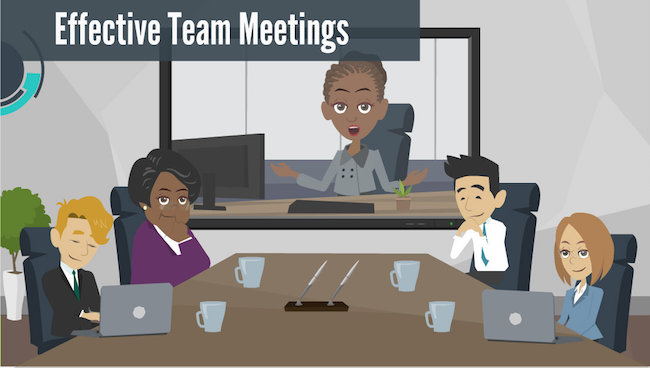
Want to run an effective meeting? The good news is that effective meetings have distinct characteristics.
So many corporate meetings are a waste of time, boring and dreadful.
Cost of Bad Meetings
In the book “How to make meetings work.” The author estimates that organizations spend 7-15% of their salary budgets on meetings.
If a company has a 10 million for salaries, then 700K to 1.5 million is spent in meetings, and that does not include time dedicated to preparation for these sessions.
The cost of bad meetings is beyond financial. As a participant in bad meetings, you know how energy drawing and productivity zapping they can be. How many times have you gone home and felt like you are wasting your life at work?
To run an effective meeting, you should know what an effective meeting looks like.
Characteristics of Effective Meetings
You know when you’ve been at a good meeting; time passes quickly, you come out feeling good, things get done, and you know where you stand. You, also know when you’ve attended a bad meeting; you space out, no one knows what’s going on, no outcome achieved.
So whats the criteria for great and effective meetings:
1. Effective meetings are productive
Effective meetings always have a goal. The goal could be to brainstorm, to agree on a timeline, to decide next steps, etc. If the goal is achieved then the meeting is productive, if steps are made in the direction of reaching the goal, then the meeting is semi productive, and if nothing gets done towards the achievement of the goal, then the meeting is not productive.
2. Effective meetings are safe
Have you been to a meeting and felt that you have to be on guard? That’s a sign of a risky environment. When people feel threatened, they don’t share, participate and give a 100%. A safe environment facilitates different point of views and encourages participation.
3. Effective meetings are well organized
Your meetings can be formal or informal depending on company culture, but they have to be organized. Disorganized meetings reduce productivity and reflect poorly on your leadership skills.
An organized meeting has a beginning, a middle and an end with different goals to achieve and items of attack. Organized meetings also cause compounded productivity.
Since an organized meeting establishes the rhythm and cadence of future meetings, then participants will stop worrying about how the meeting will run and start focusing on the issues at hand with greater intensity. This causes a productive compounding effect leading better and better meetings.
4. Effective meetings are relevant and engaging
Have you been to a meeting and thought “what does this have to do with me?” I bet that was not a great meeting to attend because it was not relevant to you. Meetings have to have the relevant people in them for the decision, or the content has to be made relevant to the people attending.
5. Effective meetings are efficient
If you go in circles, repeat things, revisit old issues in every meeting then your meetings are not efficient. The main cause of inefficiency is lack of preparation.
If team members don’t read the minutes from the last meeting, if they don’t prepare their agenda for the meeting, or if they don’t do what they are supposed to do outside of the meeting, then a lot of time has to be dedicated to the meeting to handle these issues instead of the main issue.
6. They are collaborative
Meetings in your organization are supposed to be cooperative and not contentious. Collaboration brings the best in people and allows them to contribute and share. Contention brings out politics and win/lose scenarios that are not conducive to getting results. I am not saying that all competition is bad, but there is a difference between some healthy competition and chronic contention in meetings.
Conclusion
Most meetings are draining and flat out waste of time. As a leader, you don’t want your meetings to be that way. You want your meetings to be effective, and memorable.
When working as an engineer, I had my fair share of technical meetings. I only remember one of those meetings that were held every Monday at 9 am with the site’s principal engineer. I remember it because I felt important, I felt valued, and I felt that I was adding value.
In hindsight, Dave the principal engineer made every Monday meeting productive, safe, organized, engaging, efficient, and collaborative. At the end of that meeting, I felt great and ready to tackle the week.
